As of close of business this evening there are 582 recently arrived asylum seekers without State provided accommodation.
Residents living near the International Protection Office on Mount Street in Dublin 2 have raised concerns about the welfare of international protection applicants living in tents in the surrounding area.
They have also complained to Dublin City Council about a failure to remove waste building up in the area as a result.
At the end of March, there were two tents sheltering homeless asylum seekers near the International Protection Office (IPO), where newly arrived asylum seekers initiate claims for international protection.
Today there were more than 30 tents pitched on the surrounding streets.
Since the beginning of the year, the number of people seeking International Protection in Ireland halved, from 1,306 in January to 633 in April.
Nevertheless, since 24 January, 1,031 newly arrived adult international protection applicants were initially told there was no accommodation available for them due to a nationwide shortage.
The latest figures released by the Department of Children, Equality, Disability, Integration and Youth show that 449 of them have since been offered accommodation, but 582 remain without and all bar two are men.
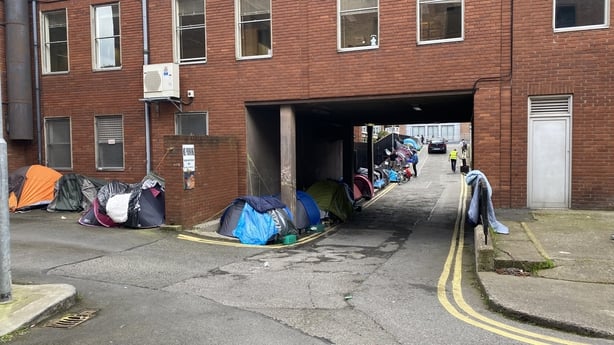
While not all of those without State provided accommodation are sleeping rough, the number of those sleeping on the streets is growing.
Unlike other rough sleepers, homeless asylum seekers cannot access emergency homeless accommodation.
The Dublin Regional Homeless Executive confirmed to RTÉ News that it "does not have a role in the provision of accommodation to asylum seekers. That falls under the remit of the Department of Children, Equality, Disability, Integration and Youth."
This day two weeks ago the High Court found the Minister for Children Roderic O'Gorman's failure to provide shelter, food, and basic hygiene facilities to an asylum seeker was unlawful and in breach of the Charter of Fundamental Rights of the European Union.
RTÉ News has seen emails written by residents living near the IPO to local TDs raising concerns about the situation unfolding in the area.
In one email a resident wrote "We are required to provide basic accommodation under EU law. It is a humanitarian crisis that affects people on every level. I cannot believe that the State has enabled this reality. Could you please use your influence to get something done for these poor people, as well as to help the health and safety aspects of my area, where disease and rat infestation is now a reality?"
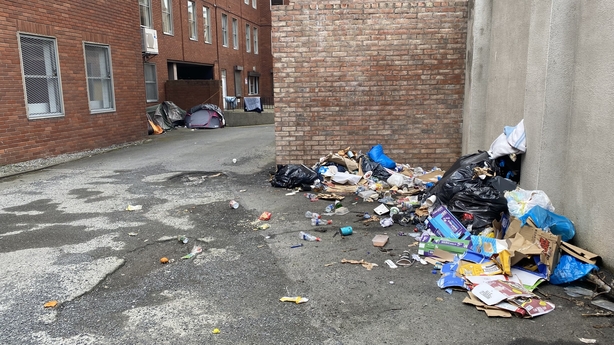
In more emails seen by RTÉ News residents requested Dublin City Council's help in removing waste and litter from an area near the tents.
"... the litter is deposited from migrants who are camped on the public road. The State's inability to house or provide adequate emergency facilities for these people is the contributing factor to this mess," one email read.
Residents told RTÉ News that Dublin City Council maintains that the waste is on private property but said it is investigating.
In response to a query by RTÉ News, a spokesperson from Dublin City Council Waste Management said they would look into the matter and reply in the coming days.
Fianna Fáil TD for Dublin Bay South Jim O'Callaghan said that he had been contacted by a number of local residents living in the Mount Street area.
"They're very sympathetic to the predicament that the people in the tents find themselves in, but the concerns they have is that its changing the whole character of street, its creating a different impact for people who are living there and for people who are working there," Mr O'Callaghan said, describing it as "a difficult situation".
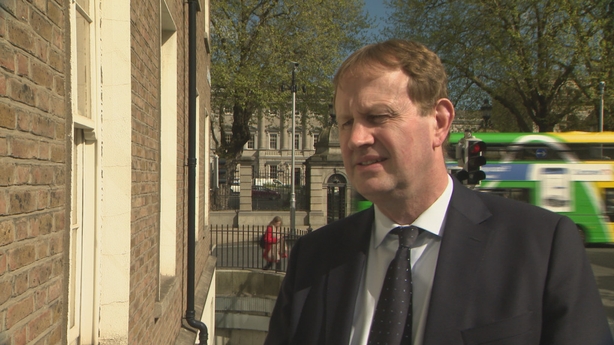
A spokesperson for the Department said that "officials are working tirelessly to bring more bed spaces into use."
"Since the beginning of 2023, more than 5,300 bed spaces have been brought into use by IPAS (the International Protection Accommodation Service) to accommodate both new arrivals and 2,540 people who have had to be re-accommodated from hotels where contracts ended in the first four months of this year."
"While demand continues to outstrip supply, particularly for single male adults, the Department has ensured that all families and children have been accommodated," they said.
They added that "IPAS is now issuing non accommodated persons with weekly €50 vouchers. They are entitled to a payment of the equivalent of the Daily Expenses Allowance (€38.80) and this has been backdated to the point at which they applied for international protection. They are also entitled to (apply for discretionary) exceptional needs payments from the Department of Social Protection."
Volodymyr has lived in one of the tents near the IPO for three weeks.
"It's better than to be in a basement in Ukraine or to be dead in Ukraine anyway," he said.
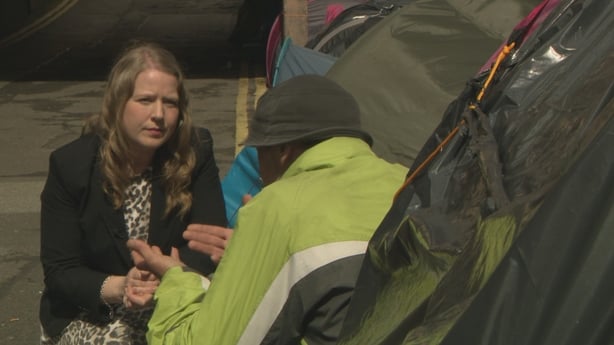
Originally from Ukraine, Volodymyr was not in his home country when the war broke out, and therefore does not qualify for the temporary protection afforded to most Ukrainians who flee here.
Instead, he is claiming international protection in Ireland.
"I'm safe here. I fled from Ukraine, I fled from Russia, I'm ok here, its better than to be there," he said.
Volodymyr explained that he and the others living in the tents try to keep the area clean.
"I try to have a small bag for trash and I try to take it with me every time I go (away from here) and put in a small bin, and not to keep it here," he said.
Lucas stays in a nearby tent. He described having belongings including his wallet stolen from him in Dublin 1.
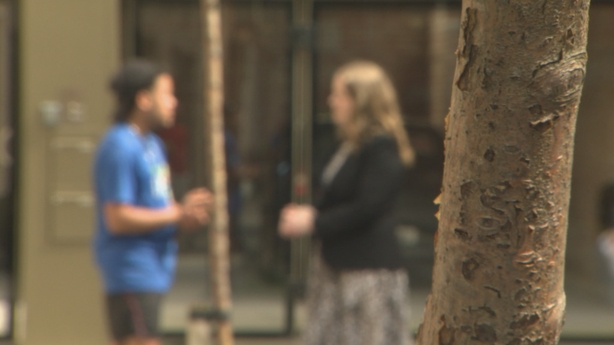
"For me it's more safe (here) than in other places. Dublin 1 for me is more dangerous, the GPO area, the Dublin city centre," he said.
Lucas said that understands residents' concerns but said that he and other homeless asylum seekers have nowhere else to go.
"This situation is not good for me, for (the) homeless, for everyone, but the Government needs to look at us. In one moment, this needs to stop, you know?"







